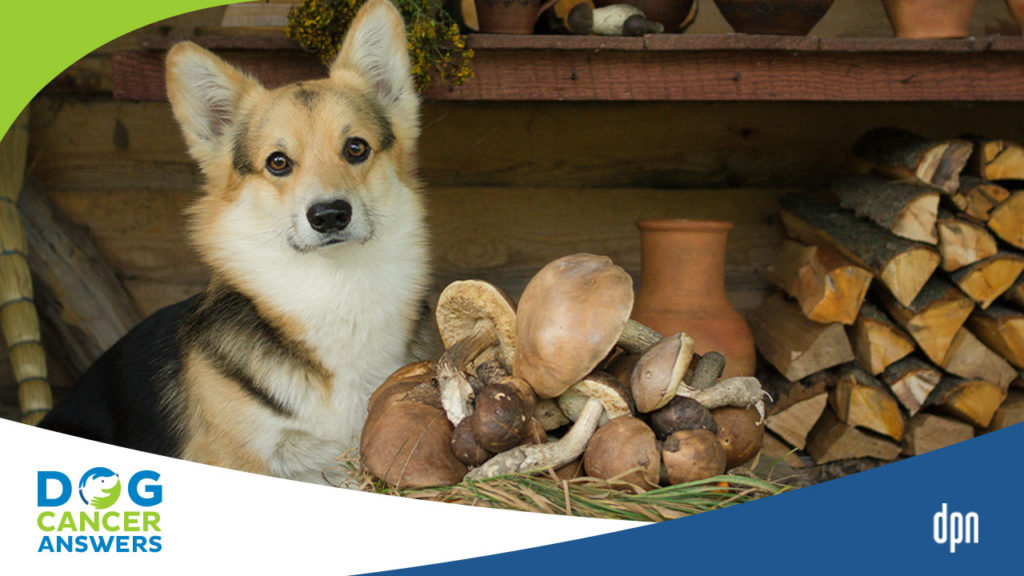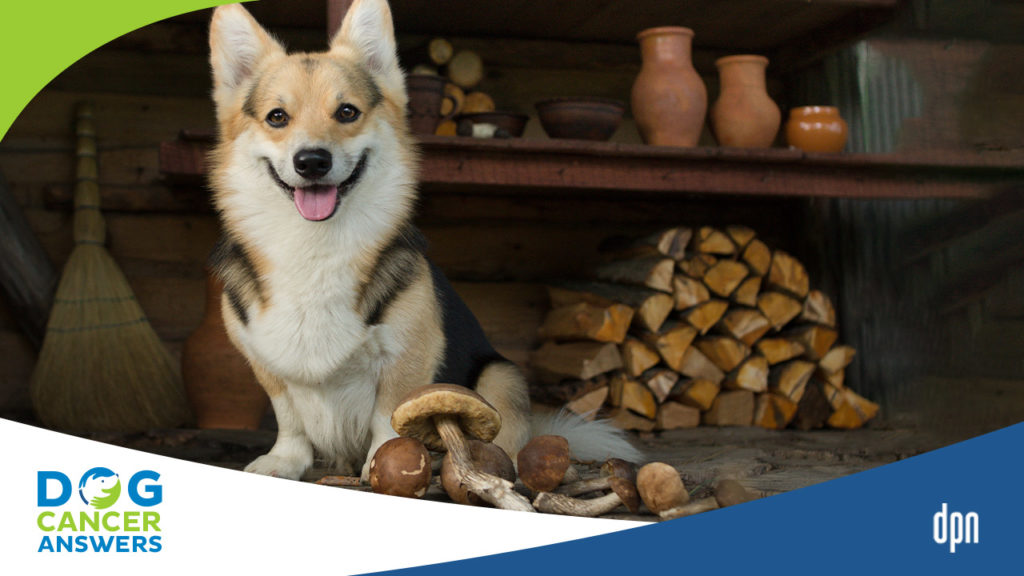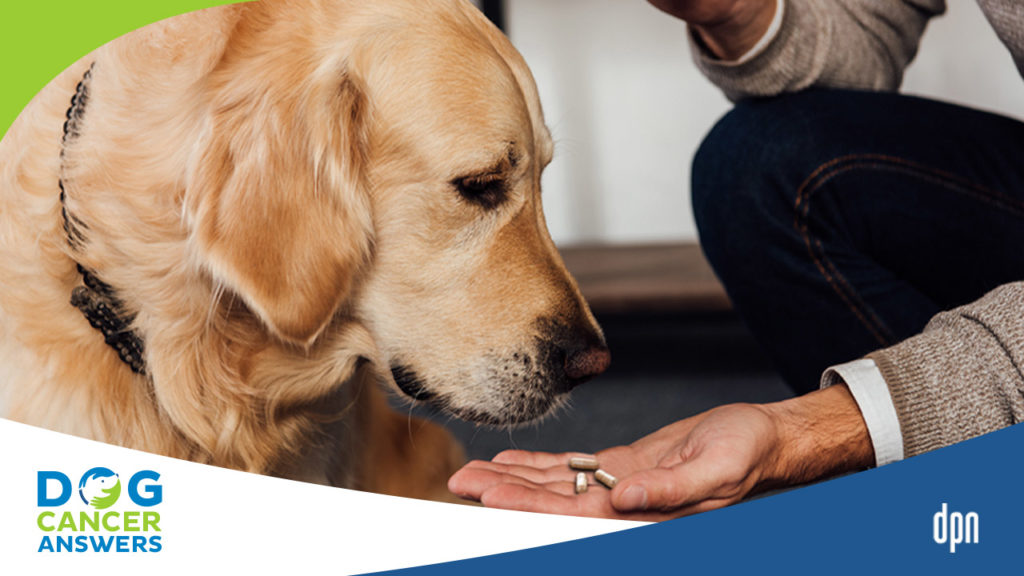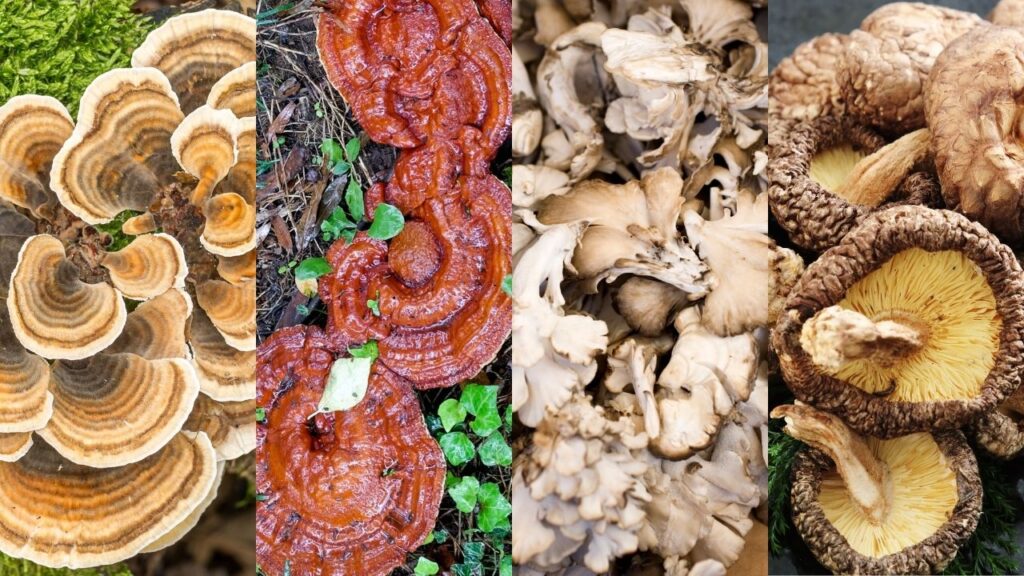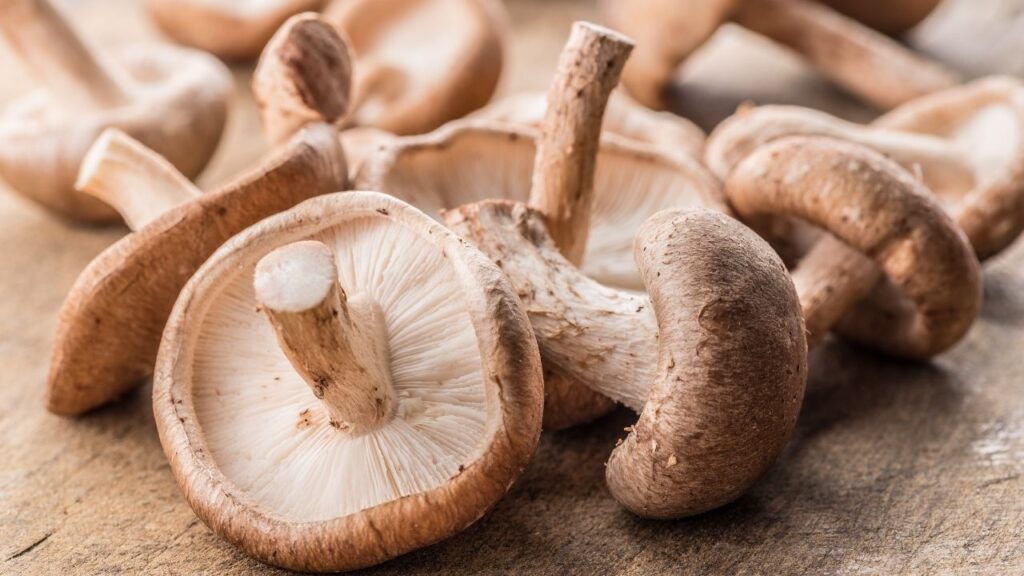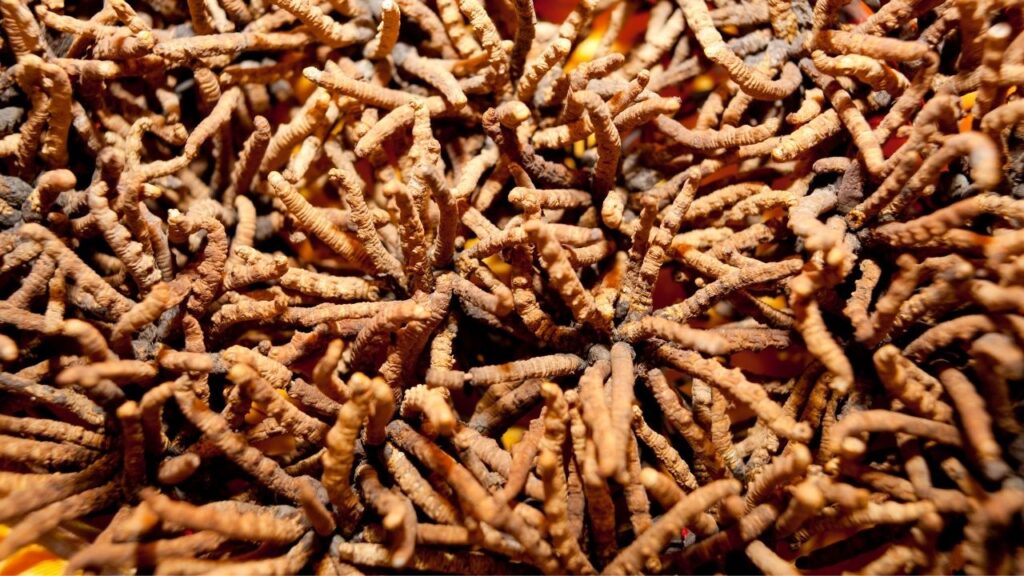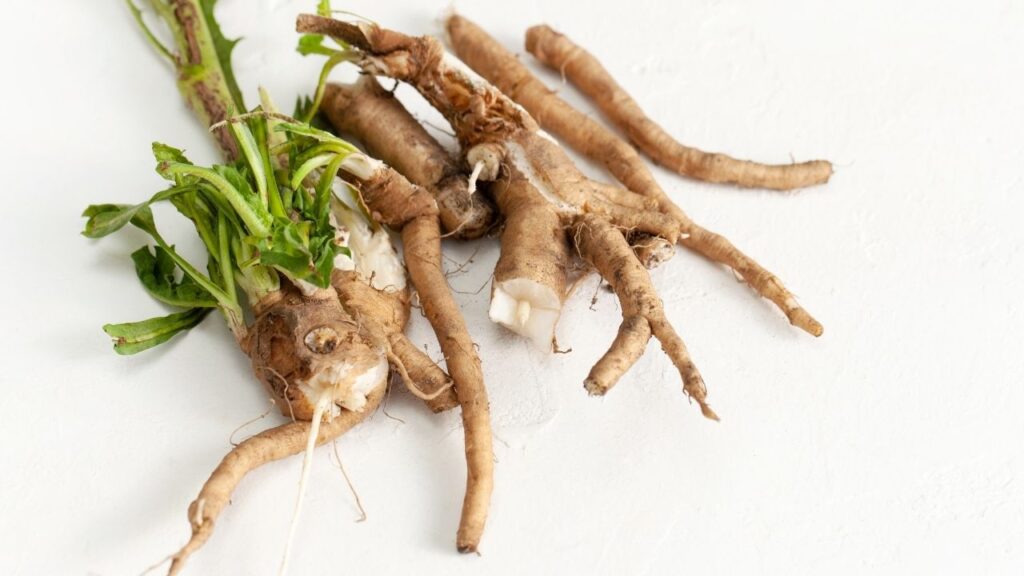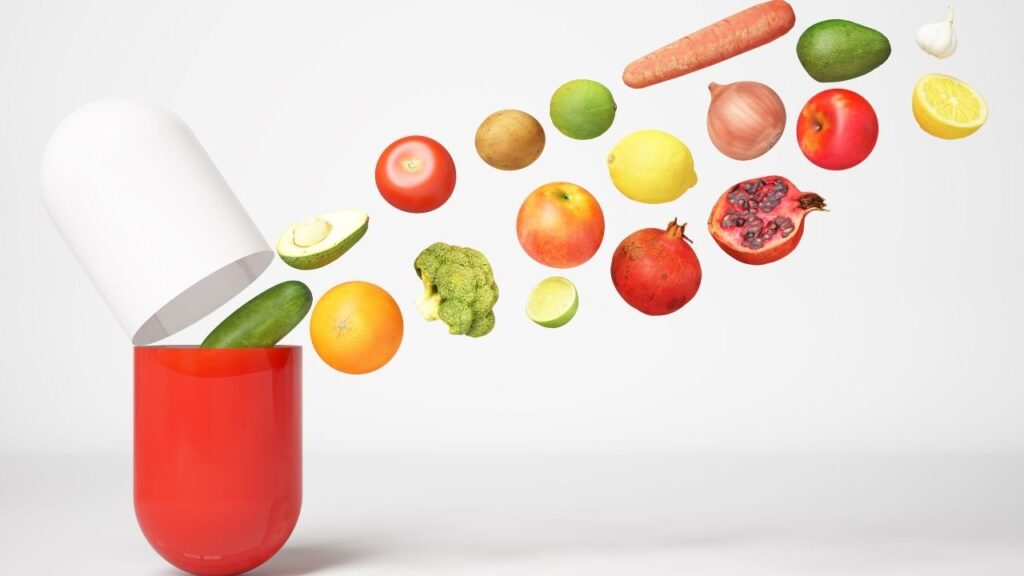Turkey tail mushroom was one of the first integrative cancer therapies to undergo a clinical trial in Veterinary Medicine, with one study showing that mushroom-derived polysaccharides from turkey tail may delay metastasis and increase survival times in dogs with hemangiosarcoma.
Key Takeaways
- Turkey tail mushroom is safe for dogs as long as you don’t feed it raw.
- How much turkey tail mushroom you can give your dog depends on the product. One way to dose it is 20-30mg of beta glucans per kg of your dog’s weight.
- Benefits of turkey tail mushroom in dogs include boosting immune response, managing side effects from chemo or radiation, possibly delaying cancer spread, and possibly increasing survival times.
- Turkey tail can be helpful for cancer in dogs. Initial studies have shown it may slow the spread of cancer and improve survival times.
- Turkey tail is unlikely to shrink tumors but will help support your dog’s overall health.
- Turkey tail mushroom is not usually hard on the liver and is very well tolerated by most dogs.
Turkey Tail Mushroom for Dogs: Known by Many Names
Veterinarians are often open to recommending turkey tail mushroom for dogs with cancer, because it is the first integrative therapy to undergo clinical trials. (More on that below.)
Turkey tail is a mushroom of many names, including Coriolus versicolor, Trametes versicolor, Polyporus versicolor, Yun Zhi, kawaratake, and cloud mushroom. It is widely used and studied in China.1
This and other mushrooms are a source of mushroom-derived polysaccharides, natural compounds that can help treat and manage dog cancer.
Mushroom-Derived Polysaccharides
The most important mushroom-derived polysaccharides are beta-glucans, which include polysaccharide-K (PSK) and polysaccharide-P (PSP).1,2 Turkey tail is also a source of ergosterol.15
Sources and Products
There are many sources and products of turkey tail mushrooms, which can be processed in several ways. Hot water extract is the richest in beta-glucans, making it the preparation method of choice for many practitioners.24
The best-known turkey tail mushroom product is I’m-Yunity, which was used in two clinical trials through the University of Pennsylvania.3,4
- These studies followed dogs with hemangiosarcoma.
- The pilot study showed that giving I’m-Yunity slowed metastasis and increased survival times.
- The second study found that treating with I’m-Yunity did not significantly affect survival times.
Despite I’m Yunity’s name recognition, many other turkey tail products are out there, so talk to your vet about which one might be the best fit for your dog.
Evidence for Turkey Tail Mushroom Benefits
Turkey tail mushroom-derived polysaccharides have been studied in vitro (in a lab) and in vivo (in the body) in rodents, humans, and dogs.
As far as integrative dog cancer treatments go, it is one of the most studied supplements. That said, there is still a lot that we don’t fully understand about how these mushroom products work in the body.
Studies in Dogs
A 2012 study looking at the turkey tail mushroom product I’m-Yunity in dogs with hemangiosarcoma found that it delayed metastasis (slowed spread of the cancer) and improved survival times, especially at higher doses.3
- The median survival time for dogs who received 50mg/kg each day was 117 days.
- The median survival time for dogs who received 100mg/kg each day was 199 days.
A follow-up 2022 study compared dogs with hemangiosarcoma who received three different treatment plans:4
- Splenectomy (surgical removal of the spleen) and I’m-Yunity
- Splenectomy and doxorubicin chemotherapy
- Dogs treated with all three: splenectomy, I’m-Yunity, and doxorubicin
This study found that female dogs had better survival times if they received chemotherapy (with or without turkey tail) and that males had no difference in survival time based on the treatment group.
Overall, dogs who received doxorubicin had longer median survival times than dogs who only received I’m-Yunity, and adding I’m-Yunity to doxorubicin did not significantly change survival times.4
Dr. Robert Silver, a veterinarian who works with medicinal mushrooms, expresses his disappointment in the results of this follow-up study, and also the flaws in study design, in this episode of DOG CANCER ANSWERS.
Dr. Robert Silver introduces us to the magical world of medicinal mushrooms on DOG CANCER ANSWERS.
Other Studies
Those I’m Yunity studies are the only ones to date performed with dogs. However, many more studies have examined how turkey tail mushroom affects cancer cells in humans, rodents, and cell cultures in a lab. While none of these results guarantee the same will happen in dogs, they help veterinarians understand when turkey tail may be useful while we wait for more studies in dogs specifically.
- A 1984 study found that PSK from turkey tail mushrooms helped to normalize the immune system and increase the activity of killer T cells (immune cells) in mice with cancer. PSK, also known as Krestin, has been used as a cancer treatment in Japan.5,6
- A 2000 review paper discusses the ability of mushroom-derived polysaccharides to boost immune system function.7
- A 2003 study found that PSP from turkey tail mushrooms slowed the progression of non-small cell lung cancer in humans.8
- A 2004 paper discusses the ability of turkey tail and other edible mushrooms to decrease DNA damage, reduce carcinogens within the body, slow the growth of cancer cells, stimulate the immune system, and induce apoptosis (natural cell death) in cancer cells.9
- A 2004 review discusses the ability of turkey tail to enhance the immune system and improve the quality of life for humans undergoing surgery or chemotherapy for cancer.6
- A 2005 study looking at turkey tail mushroom extract in human breast cancer cell lines showed turkey tail likely works against cancers by inducing apoptosis to slow cancer spread and potentially destroy cancer cells.10
- A 2006 study looking at turkey tail mushroom extract in mice that had been grafted with human leukemia cells showed that turkey tail induced apoptosis to slow cancer spread.11
- A 2008 paper discusses that beta-glucans can increase white blood cell activity and modulate the immune system.12
- A 2010 study looking at turkey tail mushroom extract in human liver cancer cell lines showed turkey tail induced apoptosis to slow cancer proliferation.13
- A 2012 review of randomized, placebo-controlled, and double-blinded trials in humans with cancer revealed that turkey tail mushroom increases survival rates. It was especially helpful for breast, stomach, and colorectal cancers.14
- In 2012 the FDA approved trials to look at turkey tail as an anti-cancer agent in humans.
- A 2017 study found that ergosterol increased the ability of amphotericin B to initiate cell death in human liver cancer cell lines.15
Dr. Demian Dressler, author of The Dog Cancer Survival Guide, explains his preferred supplements for dogs with cancer, including medicinal mushrooms.
Common Uses of Turkey Tail for Dogs
Common uses for turkey tail mushroom products in dogs with cancer are to:
- Boost immune response12,16
- May delay metastasis, especially in hemangiosarcoma3,4
- May increase survival times, especially in hemangiosarcoma3,4
- Manage side effects during chemotherapy or radiation1
Turkey tail also has been shown to have some anti-cancer effects in various human cancers, so it is likely beneficial for dog cancers other than hemangiosarcoma.
Turkey Tail Mushroom for Dogs Side Effects
Turkey tail mushroom products are very well-tolerated in dogs for the most part,6 but any supplement can have adverse effects in individual dogs.
Here are some things to keep in mind if giving your dog turkey tail mushroom:
- May cause nausea, vomiting, and/or diarrhea, just like any other oral supplement.
- Can stabilize blood glucose levels, so diabetic dogs should be monitored closely and may need insulin dose adjustments.17
- Can be contaminated with toxic levels of arsenic, lead, cadmium, or mercury, or with radioactive 137Cs, especially when wild-harvested. Take care when selecting a product, and look for quality control measures and contamination testing protocols.18
Using Turkey Tail with Other Treatments
Turkey tail mushroom products have been shown in human studies to be safe to give at the same time as:19,20
- Chemotherapy
- Radiation
- Surgery
Turkey tail is also safe to combine with many supplements and medications, but always check with your dog’s veterinarian before adding something new.
When to Not Use Turkey Tail for Dogs
While turkey tail mushroom products are generally very safe and can be used along with surgery, chemo, and radiation, there are some situations where it may not be a good fit:1
- Dogs with autoimmune disorders. Turkey tail mushrooms could potentially worsen these conditions and should be used cautiously.
- Dogs on immunosuppressive medications. Because turkey tail typically enhances immune system function, it may interfere with these medications. Consult with your dog’s veterinarian before use.
- Dogs undergoing a bone marrow transplant. Turkey tail could potentially interfere with the success of the bone marrow transplant. Consult with your veterinarian before use.
Turkey Tail Mushroom for Dogs Dosage and Choosing a Product
Turkey tail mushroom products are typically given by mouth, and it is bioavailable when given orally (meaning that your dog can absorb and use the compounds).21,22,23
Types of products include extracts, mycelium, the fruiting body, or whole mushroom. Feeding raw mushrooms is generally not recommended.
Hot water extract is the preferred preparation method, yielding the highest beta-glucans content at 30-40%.24
Most products are powder, which may be loose in a container to measure with a scoop, or pre-dosed in capsules.
Exact dosing and frequency may vary between products. Some products recommend splitting the daily dose into two servings at mealtimes, while others recommend giving the full dose at once.
Dr. Rob Silver, DVM of Real Mushrooms, recommends giving 20-30mg/kg of beta-glucans to your dog each day. To figure this out, convert your dog’s weight to kilograms (kg) by dividing her weight in pounds by 2.2. Then multiply that by 20 or 30 to get your target dose in milligrams (mg). Find the beta-glucans concentration of your product on the label and divide the total dose by this number.
Dr. Robert Silver reviews specific mushrooms and their helpful qualities, plus dosing advice.
What If I Miss a Dose?
If you miss giving your dog a dose of turkey tail mushroom, don’t panic. Give it as soon as you remember, and then wait the normal amount of time before giving the next dose. Missing a dose is not likely to cause any problems in the short or long term.
Storage and Handling
Store turkey tail mushroom products in a cool, dry location away from light.
Refer to the packaging for the specific product you give your dog for any special instructions.
Our Take
Turkey tail mushroom supplements get two paws up! Turkey tail is an excellent choice to help support your dog’s immune system and relieve side effects from other treatments. It may even help to combat specific cancers such as hemangiosarcoma.
- Chu KKW, Ho SSS, Chow AHL. Coriolus versicolor: A medicinal mushroom with promising immunotherapeutic values. Journal of Clinical Pharmacology. 2002;42(9):976-984. doi:10.1177/009127002401102894
- Chang Y, Zhang M, Jiang Y, et al. Preclinical and clinical studies of Coriolus versicolor polysaccharopeptide as an immunotherapeutic in China. Discovery Medicine. https://www.discoverymedicine.com/Yajing-Chang-2/2017/04/coriolus-versicolor-polysaccharopeptide-as-an-immunotherapeutic-in-china/. Published April 21, 2017. Accessed April 5, 2023.
- Brown DC, Reetz J. Single agent polysaccharopeptide delays metastases and improves survival in naturally occurring hemangiosarcoma. Evidence-Based Complementary and Alternative Medicine. 2012;2012:1-8. doi:10.1155/2012/384301
- Gedney A, Salah P, Mahoney JA, et al. Evaluation of the anti‐tumour activity of coriolus versicolor polysaccharopeptide (i’m‐yunity) alone or in combination with doxorubicin for canine splenic hemangiosarcoma. Veterinary and Comparative Oncology. 2022;20(3):688-696. doi:10.1111/vco.12823
- Tsukagoshi S. Krestin (PSK). Cancer Treatment Reviews. 1984;11(2):131-155. doi:10.1016/0305-7372(84)90005-7
- Hobbs C. Medicinal value of Turkey tail fungus trametes versicolor (l.:fr.) Pilat (aphyllophoromycetideae). A literature review. International Journal of Medicinal Mushrooms. 2004;6(3):195-218. doi:10.1615/intjmedmushr.v6.i3.10
- Tzianabos AO. Polysaccharide immunomodulators as therapeutic agents: Structural aspects and biologic function. Clinical Microbiology Reviews. 2000;13(4):523-533. doi:10.1128/cmr.13.4.523
- TSANG KW, LAM CL, YAN C, et al. Coriolus versicolor polysaccharide peptide slows progression of advanced non-small cell lung cancer. Respiratory Medicine. 2003;97(6):618-624. doi:10.1053/rmed.2003.1490
- Rajewska J, Bałasińska B. [biologically active compounds of edible mushrooms and their beneficial impact on health]. Postepy higieny i medycyny doswiadczalnej (Online). https://pubmed.ncbi.nlm.nih.gov/15536392/. Published 2004. Accessed April 5, 2023.
- Ho C-Y, Kim C-F, Leung K-N, et al. Differential anti-tumor activity of Coriolus versicolor (Yunzhi) extract through p53- and/or BCL-2-dependent apoptotic pathway in human breast cancer cells. Cancer Biology & Therapy. 2005;4(6):638-644. doi:10.4161/cbt.4.6.1721
- Ho C-Y, Kim C-F, Leung K-N, et al. Coriolus versicolor (Yunzhi) extract attenuates growth of human leukemia xenografts and induces apoptosis through the mitochondrial pathway. Oncology Reports. September 2006. doi:10.3892/or.16.3.609
- Volman JJ, Ramakers JD, Plat J. Dietary modulation of immune function by β-glucans. Physiology & Behavior. 2008;94(2):276-284. doi:10.1016/j.physbeh.2007.11.045
- Cai X, Pi Y, Zhou X, Tian L, Qiao S, Lin J. Hepatoma cell growth inhibition by inducing apoptosis with polysaccharide isolated from Turkey tail medicinal mushroom, trametes versicolor (L.: Fr.) Lloyd (Aphyllophoromycetideae). International Journal of Medicinal Mushrooms. 2010;12(3):257-263. doi:10.1615/intjmedmushr.v12.i3.40
- L.Y. Eliza W, K. Fai C, P. Chung L. Efficacy of Yun Zhi (coriolus versicolor) on survival in cancer patients: Systematic review and meta-analysis. Recent Patents on Inflammation & Allergy Drug Discovery. 2012;6(1):78-87. doi:10.2174/187221312798889310
- Lin Y-C, Lee B-H, Alagie J, Su C-H. Combination treatment of ergosterol followed by amphotericin B induces necrotic cell death in human hepatocellular carcinoma cells. Oncotarget. 2017;8(42):72727-72738. doi:10.18632/oncotarget.20285
- Chan GC-F, Chan WK, Sze DM-Y. The effects of β-glucan on human immune and cancer cells. Journal of Hematology & Oncology. 2009;2(1). doi:10.1186/1756-8722-2-25
- Kim Y-W, Kim K-H, Choi H-J, Lee D-S. Anti-diabetic activity of β-glucans and their enzymatically hydrolyzed oligosaccharides from Agaricus blazei. Biotechnology Letters. 2005;27(7):483-487. doi:10.1007/s10529-005-2225-8
- Borchers AT, Keen CL, Gershwin ME. Mushrooms, tumors, and immunity: An update. Experimental Biology and Medicine. 2004;229(5):393-406. doi:10.1177/153537020422900507
- Wasser S. Medicinal mushrooms as a source of antitumor and immunomodulating polysaccharides. Applied Microbiology and Biotechnology. 2002;60(3):258-274. doi:10.1007/s00253-002-1076-7
- Abascal K, Yarnell E. A turkey tails polysaccharide as an immunochemotherapy agent in cancer. Alternative and Complementary Therapies. 2007;13(4):178-182. doi:10.1089/act.2007.13410
- Rice PJ, Adams EL, Ozment-Skelton T, et al. Oral delivery and gastrointestinal absorption of soluble glucans stimulate increased resistance to infectious challenge. Journal of Pharmacology and Experimental Therapeutics. 2005;314(3):1079-1086. doi:10.1124/jpet.105.085415
- Suzuki I, Hashimoto K, Ohno N, Tanaka H, Yadomae T. Immunomodulation by orally administered β-glucan in mice. International Journal of Immunopharmacology. 1989;11(7):761-769. doi:10.1016/0192-0561(89)90130-6
- Hong F, Yan J, Baran JT, et al. Mechanism by which orally administered β-1,3-glucans enhance the tumoricidal activity of antitumor monoclonal antibodies in murine tumor models. The Journal of Immunology. 2004;173(2):797-806. doi:10.4049/jimmunol.173.2.797
- Redefining medicinal mushrooms: A new way to gauge quality in medicinal mushrooms. Nammex. https://www.nammex.com/redefining-medicinal-mushrooms/. Published January 29, 2019. Accessed April 5, 2023.
- Jacobson M, Silver R. Medicinal Mushrooms for Dog Cancer Part 2. Dog Cancer Answers. October 2022.
Topics
Did You Find This Helpful? Share It with Your Pack!
Use the buttons to share what you learned on social media, download a PDF, print this out, or email it to your veterinarian.
